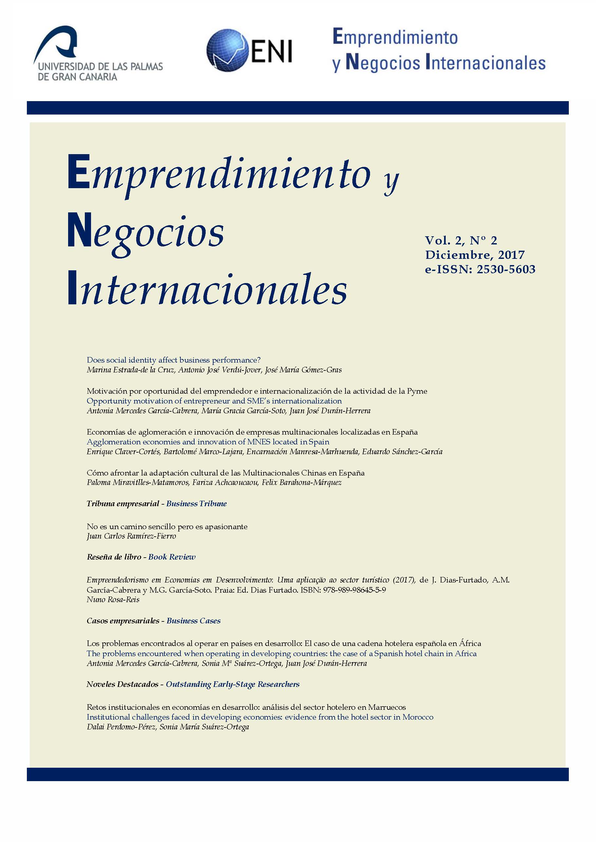Does social identity affect business performance?
Resumen
The business founder’s social identity is crucial to explaining his or her behaviour and attitude in business decision-making. Drawing on three types of entrepreneurial social identity identified by Fauchart and Gruber (2011), this study examines how social identities influence the entrepreneur’s way of managing his/her firm and its consequences for business performance. Based on a survey of newly created firms, the results support the conclusion that effectuation channels the effects of specific identities - Darwinian and missionary- on business performance.
Descargas
Citas
Alsos, G.A., Clausen, T.H., Hytti, U., & Solvoll, S. (2016). Entrepreneurs’ social identity and the preference of causal and effectual behaviours in start-up processes. Entrepreneurship & Regional Development, 28(3-4), 234-258.
Baron, R.M., & Kenny, D.A. (1986). The moderator–mediator variable distinction in social psychological research: Conceptual, strategic, and statistical considerations. Journal of Personality and Social Psychology, 51(6), 1173.
Chandler, G.N., DeTienne, D.R., McKelvie, A., & Mumford, T.V. (2011). Causation and effectuation processes: A validation study. Journal of Business Venturing, 26(3), 375-390.
Eddleston, K.A., Kellermanns, F.W., & Sarathy, R. (2008). Resource configuration in family firms: Linking resources, strategic planning and technological opportunities to performance. Journal of Management Studies, 45(1), 26-50.
Fauchart, E., & Gruber, M. (2011). Darwinians, communitarians, and missionaries: The role of founder identity in entrepreneurship. Academy of Management Journal, 54(5), 935-957.
Hoang, H., & Gimeno, J. (2010). Becoming a founder: How founder role identity affects entrepreneurial transitions and persistence in founding. Journal of Business Venturing, 25(1), 41-53.
Hogg, M.A., & Terry, D.I. (2000). Social identity and self-categorization processes in organizational contexts. Academy of Management Review, 25(1), 121-140.
Rosenberg, M. (1979). Conceiving the Self. Basic, NY.
Sarasvathy, S.D. (2001). Causation and effectuation: Toward a theoretical shift from economic inevitability to entrepreneurial contingency. Academy of Management Review, 26(2), 243-263.
Sarasvathy, S.D. (2008). Effectuation: Elements of Entrepreneurial Expertise, New Horizons in Entrepreneurship. Cheltenham: Edward Elgar.
Sarasvathy, S.D., & Dew, N. (2005). New market creation through transformation. Journal of Evolutionary Economics, 15(5), 533-565.
Sarasvathy, S.D., & Dew, N. (2013). Without judgment: An empirically-based entrepreneurial theory of the firm. The Review of Austrian Economics, 26(3), 277-296.
Shane, S.A. (2003). A general theory of entrepreneurship: The individual-opportunity nexus. Edward Elgar Publishing.
Sieger, P., Gruber, M., Fauchart, E., & Zellweger, T. (2016). Measuring the social identity of entrepreneurs: Scale development and international validation. Journal of Business Venturing, 31(5), 542-572.
Tajfel, H., & Turner, J.C. (1979). An integrative theory of intergroup conflict. The Social Psychology of Intergroup Relations, 33(47), 74.
Descargas
Publicado
Número
Sección
Licencia
Derechos de autor propuestos por Creative Commons
1. Política propuesta para revistas que ofrecen acceso abierto
Aquellos autores/as que tengan publicaciones con esta revista, aceptan los términos siguientes:
- Los autores/as conservarán sus derechos de autor y garantizarán a la revista el derecho de primera publicación de su obra, el cuál estará simultáneamente sujeto a la Licencia de reconocimiento de Creative Commons que permite a terceros compartir la obra siempre que se indique su autor y su primera publicación esta revista.
- Los autores/as podrán adoptar otros acuerdos de licencia no exclusiva de distribución de la versión de la obra publicada (p. ej.: depositarla en un archivo telemático institucional o publicarla en un volumen monográfico) siempre que se indique la publicación inicial en esta revista.
- Se permite y recomienda a los autores/as difundir su obra a través de Internet (p. ej.: en archivos telemáticos institucionales o en su página web) antes y durante el proceso de envío, lo cual puede producir intercambios interesantes y aumentar las citas de la obra publicada. (Véase El efecto del acceso abierto).

